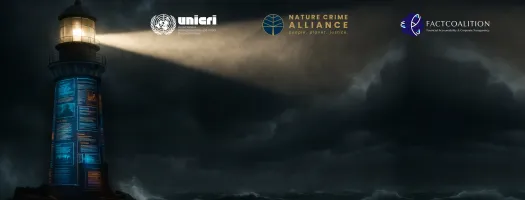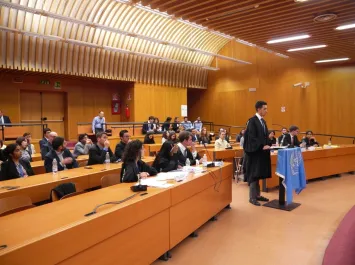29 September 2025 - 1 October 2025 (half-day sessions: 08:00 a.m. – 12:30 p.m. EDT | 02:00 p.m. – 06:30 CET p.m.)
Application deadline: 27 September 2026
Environmental crimes are among the most complex and rapidly evolving forms of criminal activity today. They often span multiple jurisdictions, involve transnational networks, and intersect with other serious crimes such as corruption, fraud, and trafficking. The impacts are far-reaching: from accelerating climate change and biodiversity loss to threatening public health, security, and the livelihoods of vulnerable communities. Despite their severity, these crimes are often underreported or misunderstood.
Accurate, responsible, and well-informed journalism plays a crucial role in uncovering environmental crimes, raising public awareness, and holding perpetrators to account. Supporting media professionals with the tools and knowledge to report on these issues is essential to promoting transparency, strengthening environmental justice, and fostering effective policy responses.
To this end, the Nature Crime Alliance Secretariat, the Financial Accountability and Corporate Transparency (FACT) Coalition, and the United Nations Interregional Crime and Justice Research Institute (UNICRI), in collaboration with key Alliance members and media associations, will deliver a free training programme for journalists and communication professionals (press officers, social media managers, institutional communicators, and other communication professionals). The course will focus on environmental crimes that pose growing safety and security risks around the world, offering a multidisciplinary approach to understanding their dynamics and improving media responses.
The high-level speakers featured in the training are:
Flaviano Bianchini, Founder and Director, Source International
Matthew Burnett-Stuart, Programme Officer, UNICRI
Katy Carroll, UNICRI CBRN Risk Mitigation and Security Governance Unit
Michela Corvino, Earth Observation Security Applications Engineer, European Space Agency (ESA)
Andrea Crosta, Executive Director and Founder, Earth League International (ELI)
Mariana Diaz Garcia, UNICRI CBRN Risk Mitigation and Security Governance Unit
Emily Fishbein, Freelance journalist focusing on Myanmar. Current Pulitzer Center Rainforest Investigations Network Fellow
Luke Foddy, Communications Manager, Nature Crime Alliance Secretariat
Dr. Meredith Gore, Professor and Research Director, University of Maryland
Francesco Marelli, Chief, UNICRI CBRN Risk Mitigation and Security Governance Unit
Ruth Noguerón, Senior Associate, Global Forest Watch and Forest Governance and Policy, World Resources Institute (WRI).
Bruce Ohr, Executive Director, International Wildlife Trust
Paul Radu, Co-Founder and Head of Innovation, Organized Crime and Corruption Reporting Project (OCCRP)
Dr. Louise Shelley, Omer L. and Nancy Hirst Endowed Chair and University Professor Emerita at George Mason University; Founder of the Terrorism, Transnational Crime and Corruption Center (TraCCC)
David Taylor, Freelance writer and adjunct professor, Science Writing Program, Johns Hopkins University
Leif Villadsen, Acting Director, UNICRI
Julia Yansura, Program Director, Environmental Crime & Illicit Finance, The Financial Accountability and Corporate Transparency (FACT) Coalition
The training will explore how organised criminal networks profit from and facilitate nature crimes, and will examine the financial mechanisms that support these operations- such as money laundering, corruption, and the abuse of secrecy jurisdictions. Participants will gain practical insights into tools and approaches drawn from intelligence analysis, financial journalism, and conservation criminology. They will learn to use scientific data, digital tools, and open-source technologies to track crime patterns, monitor environmental harm, and inform evidence-based storytelling.
Through practical sessions, participants will also strengthen their ability to conduct interviews with diverse sources - including scientists, prosecutors, law enforcement officers, and environmental defenders - while maintaining ethical and professional standards. The course will further address the growing threat of disinformation in environmental reporting and offer strategies to identify and counter false or misleading narratives.
By the end of the course, participants will be better equipped to investigate and report on local and global environmental threats with rigour, clarity, and impact. The training also seeks to build lasting connections among participating journalists and experts. In the spirit of applying the skills acquired, participants will be encouraged to develop a story or media product on environmental crime within the year following the course.
A certificate will be awarded upon full completion of the training.
How to join
To apply for the training, please send an email to marina.mazzini(at)un.org with a short CV and a brief statement of interest explaining your motivation to participate and how the training could support your professional work.
Please indicate in the subject line of your email: Application – Environmental Crimes Media Training 2025.



